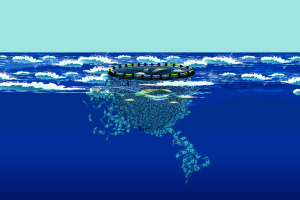Caught Out: How UK retailers are tackling the use of wild fish in their aquaculture supply chains

Executive summary
With most UK seafood purchased in supermarkets, and 70% of shoppers keen to buy sustainable fish, retailers have a duty to lead the way on ocean stewardship. This report explores how well they are living up to this responsibility when it comes to the farmed seafood on their shelves.
In 2015, 93% of the world’s marine fish stocks were either fished to their limit or overfished. With communities around the world depending on healthy fish stocks for their nutritional needs and livelihoods, it is imperative that our oceans are properly managed and valued. In this context, aquaculture – fish farming – appears to present a solution. Instead of taking fish from the ocean, we can farm them on land or in the sea, creating a healthy source of protein without reaching environmental limits. Unfortunately, the picture is not so simple. One of the biggest buyers for the world’s catch of pelagic fish, such as sardines, herring and anchovies, are the aquaculture and agriculture industries. Almost one-fifth of global fish landings are currently used to produce fishmeal and fish oil (FMFO) to supply industrial livestock and aquaculture, and demand is set to grow as the aquaculture industry expands.
In the UK, we are most likely to encounter the aquaculture industry in the form of a small number of ubiquitous farmed-seafood species that now dominate our supermarkets’ fresh-fish aisles and counters. Farmed salmon (largely from Norway, Chile, Canada and Scotland) and farmed warm-water prawns (from China, Thailand, Vietnam, Indonesia and India) are the two most common farmed seafood products. Farmed sea bass, basa and trout are also widely sold in the UK. All of these species are farmed using wild fish, in the form of FMFO, in their feed. This is known as ‘fed aquaculture’.
Yet very few shoppers are aware of the origins of their farmed fish dinners – or even the fact that the fish they are eating was farmed, let alone what it was fed. In 2019, UK shoppers purchased 103,000 tonnes of the top six farmed seafood species. In doing so, they indirectly and unknowingly consumed 177,000 tonnes of wild fish in the form of the feed used to farm these products.
In their role as intermediaries between aquaculture producers and the public, supermarkets are arguably the most powerful players in the market. They are the arbiters of standards for food production throughout their supply chains; as such, they bear a critical responsibility to hold their suppliers to account, and to guarantee that ocean stewardship is upheld as an overriding principle from fishery to fork.
This report ranks the top ten UK retailers against a set of criteria designed to assess how effectively they are addressing the ocean sustainability implications of the farmed seafood they sell. We ranked the retailers as follows:

Our research placed discount retailer ALDI at the bottom of our scorecard. Despite taking the promising step last year of stocking a wider range of wild fish alternatives, to relieve pressure on species such as cod and haddock, ALDI’s policy and practice on its farmed fish did not live up to the broader sustainability image it is cultivating. ALDI did not reply to our research questions – a lack of engagement reflected in its wider failure to recognise the importance of ending farmed fish reliance on wild-caught marine ingredients, and a lack of serious corporate engagement with research on alternative feed ingredients. While ALDI, in common with most of its competitors, labelled farmed seafood on its shelves, there was no labelling information on the origin of the farmed seafood sold. At the top of the scorecard, Tesco provided evidence of extensive internal engagement with the questions raised in this report, and was the only retailer to provide ‘Fish In, Fish Out’ calculations for its top five aquaculture products. We were also encouraged by Tesco’s sustainability policies, which went beyond relying on certification as a proxy for sustainability, as well as by the retailer’s commitment to supporting the development of alternative feed ingredients for farmed fish, such as algal oil. We encourage Tesco, alongside all retailers, to set a target to eliminate wild-caught seafood ingredients in its aquaculture supply chains.
Rather than being a solution to the complex crisis threatening the health of our oceans and marine life, aquaculture reliant on FMFO for feed is placing an unacceptable burden on wild fish populations and marine ecosystems, and compromising the health and livelihoods of the people who depend on them. With growing public interest in where our food comes from, and more focus on eating responsibly and healthily, retailers cannot afford to turn a blind eye to this issue. If done responsibly, seafood farming might one day deliver on its promise of alleviating pressure on wild populations. However, the current model is deeply unsustainable and scientists warn that, if we continue with business as usual, our oceans will be pushed beyond a tipping point. Supermarkets have huge power to shape public tastes and buying choices, as well as to educate consumers on the impact of different types of seafood consumption.
No retailer has a clear target for reducing – and ultimately eliminating – whole wild-caught fish in feed, and with even top-ranking retailer Tesco achieving a middling score of 60%, it is clear that UK supermarkets still have a long way to go to ensure their aquaculture supply chains do not harm fish in the wild. Rapid action is needed to transition away from relying on wild fish, and to ensure the growth and profits of the booming farmed fish industry do not come at the expense of our oceans – and the communities whose lives depend on them. It is time for retailers to step up their commitments to sustainability, recognise the risks posed by their aquaculture supply chains, and commit to measures to phase out the use of wild-caught fish in farmed-fish feed, setting a target to achieve this goal of no later than 2025.
PARTNERS

You might also like...

Überfischung: Wildfisch als Fischfutter in Aquakulturen – Schweizer Detailhändler im Vergleich
This report outlines how effectively Swiss retailers are safeguarding the health of the oceans and fish welfare through the sustainability of their aquaculture supply chains. Read our German language report:

Dans les mailles du filet. Comment les grandes surfaces françaises font face à l’utilisation de poissons sauvages dans les chaînes d’approvisionnement aquacoles
This report evaluates the performance of the eight biggest food retailers in France when it comes to protecting our oceans and offering their customers sustainably farmed fish and seafood.

Investing in troubled waters: the material risks of fish mortality and the use of wild-caught fish in feed for the aquaculture sector
This report shows investors could be doing much more to push companies to rapidly address two critical business risks: the use of wild-caught fish in feed and high mortality rates that stem from poor fish we...